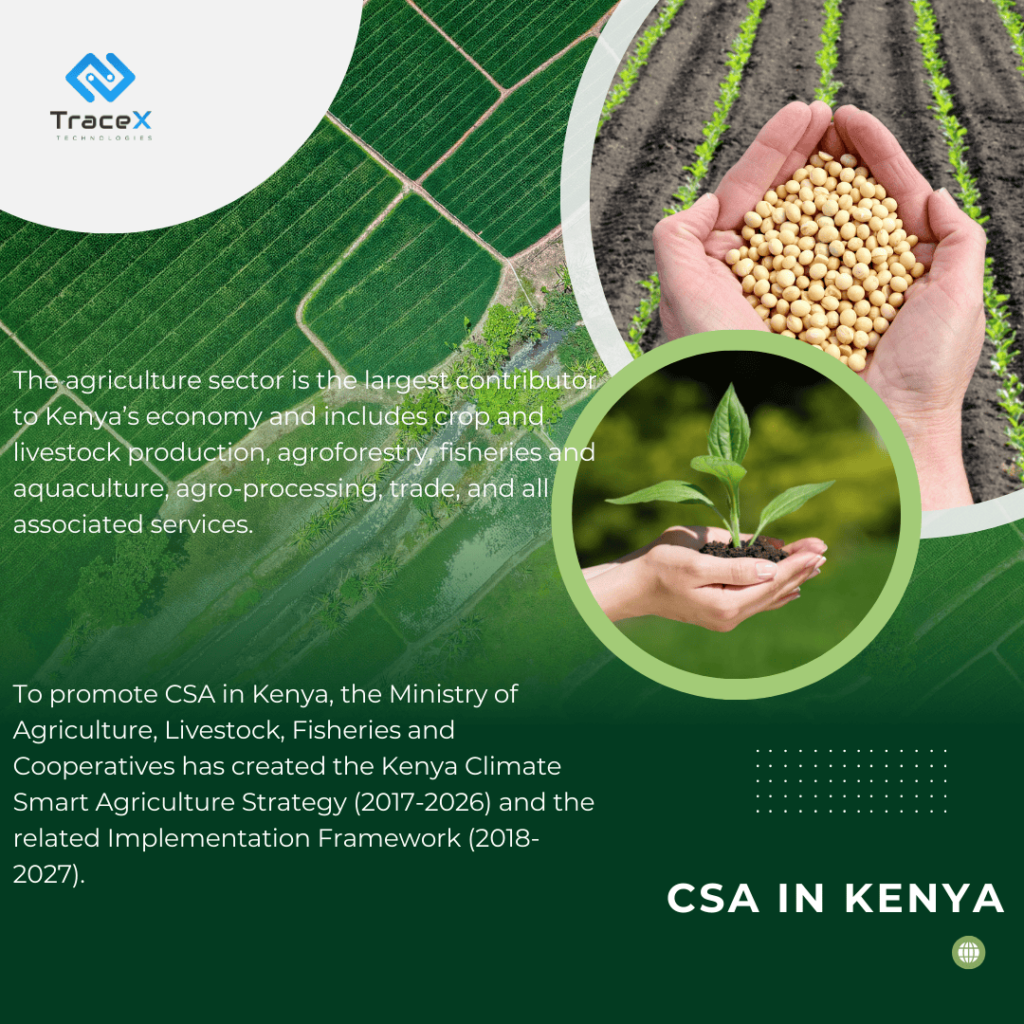Contact: +91 99725 24322 |
Menu
Menu
Quick summary: Discover how climate-smart agriculture (CSA) is transforming Kenya’s farming landscape. Learn about the strategies, benefits, and challenges of adopting CSA practices for sustainable and resilient agriculture in Kenya.

Kenya is a country blessed with rich agricultural potential, where farming plays a pivotal role in the economy and the livelihoods of millions. However, the agricultural sector is under significant pressure due to the impacts of climate change, including unpredictable weather patterns, droughts, floods, and soil degradation. Climate smart agriculture in Kenya offers innovative solutions that not only help farmers adapt to changing climates but also ensure long-term sustainability.
Kenya boasts various innovative platforms that provide avenues for enhanced productivity, adaptation, and mitigation within production systems. Notably, the Kenya Climate-Smart Agriculture Programme (2015–2030) will play a key role in coordinating both domestic and international CSA initiatives
In this blog post, we’ll dive deep into how climate-smart agriculture is being adopted in Kenya, its benefits, challenges, and the steps farmers and businesses can take to build resilience and sustainability for the future.
Key Takeaways
Climate-smart agriculture is an approach that helps farmers and agricultural systems adapt to the impacts of climate change while reducing greenhouse gas emissions. It is based on three key pillars:
1. Adaptation: Strengthening the resilience of agricultural systems to the changing climate.
2. Mitigation: Reducing emissions and improving carbon sequestration through sustainable practices.
3. Productivity: Increasing agricultural productivity and incomes in a way that doesn’t harm the environment.
CSA practices are tailored to local contexts, integrating traditional knowledge with modern techniques to ensure long-term sustainability.
Kenya, like many parts of sub-Saharan Africa, faces a volatile climate that directly impacts its agricultural sector. As the effects of climate change become more evident, farmers are struggling with erratic rainfall, rising temperatures, and frequent droughts, all of which reduce crop yields and threaten food security.
In fact, the agriculture sector accounts for a significant portion of Kenya’s GDP, contributing to 33% of the country’s total economic output.
Kenya is already seeing positive changes thanks to the adoption of climate-smart agriculture. Several CSA practices are being integrated into Kenyan farms, helping farmers mitigate the effects of climate change while boosting their productivity.

Agroforestry is the practice of integrating trees into farming systems. In Kenya, this involves planting trees alongside crops to improve soil fertility, reduce erosion, and increase water retention. Trees also act as carbon sinks, helping mitigate climate change by sequestering carbon dioxide from the atmosphere.
Farmers in areas like Nyanza and Western Kenya have successfully implemented agroforestry systems by planting fruit and timber trees, alongside annual crops such as maize, beans, and vegetables. This approach has been shown to improve crop yields, provide additional income from the sale of timber or fruit, and increase biodiversity.
Conservation agriculture involves minimum soil disturbance, crop rotation, and maintaining soil cover to enhance soil fertility and moisture retention. In Kenya, this approach has been adopted by smallholder farmers, particularly in semi-arid regions like Kitui, Machakos, and parts of Baringo. The practice helps reduce soil erosion, improve soil health, and maintain productivity in the face of changing climatic conditions.
With changing weather patterns, Kenyan farmers are increasingly turning to drought-resistant and climate-adapted crops. Varieties like drought-tolerant maize, sorghum, and millet are now more widely grown in regions that are prone to droughts. These crops require less water and are better suited for the harsh climatic conditions that have become more frequent in Kenya.
Additionally, the promotion of hybrid seeds that are resistant to diseases and pests has helped improve the resilience of crops, particularly in areas affected by increased pests due to warmer temperatures.
Efficient water management is crucial for farming in Kenya, especially in arid and semi-arid regions. Traditional rain-fed agriculture is no longer reliable in many areas, so farmers are turning to drip irrigation, rainwater harvesting, and solar-powered water pumps. These methods help conserve water, reduce costs, and ensure that crops receive the optimal amount of water for growth.
Integrated Pest Management (IPM) combines biological, cultural, and mechanical practices to control pest populations. This approach reduces the need for chemical pesticides, which can harm the environment and human health. In Kenya, farmers are using IPM to control pests in a sustainable way, thereby reducing their reliance on chemical inputs while protecting the environment.
Livestock farming is a critical part of Kenyan agriculture, but it’s also vulnerable to climate change. Climate-smart practices in livestock farming include improving animal health through better feed, vaccination, and water management, as well as the introduction of climate-resilient livestock breeds. In addition, integrating trees and shrubs into grazing areas helps enhance forage production and maintain livestock health.
Adopting climate-smart agriculture brings multiple benefits for Kenyan farmers, the environment, and the economy as a whole:
1. Improved Productivity and Food Security: Climate-smart practices boost agricultural productivity, ensuring that farmers can grow more food with fewer resources. This contributes to food security, which is vital for both rural communities and the national economy.
2. Increased Income: By adopting efficient farming techniques, farmers can reduce costs and increase yields. This translates into higher incomes, especially for smallholder farmers who represent the backbone of Kenya’s agricultural sector.
3. Environmental Sustainability: Climate-smart agriculture practices help protect the environment by reducing soil erosion, improving water quality, and enhancing carbon sequestration. This ensures that natural resources are preserved for future generations.
4. Diversification of Farming Systems: CSA encourages farmers to diversify their agricultural activities, reducing reliance on a single crop or livestock type. This helps spread risk and offers new income streams, improving the resilience of farming systems.
5. Reduced Vulnerability to Climate Change: By implementing CSA practices, farmers can adapt to changing climatic conditions, reduce losses from extreme weather events, and safeguard their livelihoods in the long run.
The future of climate-smart agriculture in Kenya will depend heavily on the integration of technology and innovation. From precision farming tools to mobile apps that provide real-time weather forecasts, technology can enhance the effectiveness of CSA practices. The use of satellite data, drone technology, and IoT devices can help monitor farm conditions and optimize resource use, further increasing efficiency and sustainability.
Additionally, public-private partnerships can play a key role in supporting CSA adoption, offering farmers access to affordable technologies, training, and financial assistance. Engaging farmers in the digital transformation of agriculture can ensure that CSA becomes a driving force for change in Kenya.
Kenyan farmers are navigating a tough climate landscape, with unpredictable weather patterns, prolonged droughts, and crop losses becoming more common. To overcome these challenges and drive Climate-Smart Agriculture (CSA) practices, farmers need tools that empower them to be both adaptable and sustainable. TraceX’s farm management solutions provide a robust platform that equips Kenyan farmers with precise data, streamlined management, and insights that enable climate resilience and sustainable farming.
With TraceX, farmers can monitor soil health, manage water resources effectively, and track crop growth in real time, all essential components of CSA. The platform’s data analytics tools help farmers make informed decisions on when to plant, irrigate, and harvest, optimizing resource use to increase productivity while reducing environmental impact. Moreover, TraceX allows for the traceability of farm inputs and outputs, offering end-to-end transparency, which is crucial for certifying crops as sustainably grown and for meeting market standards, including those that reward CSA practices.
By integrating these tools, TraceX helps Kenyan farmers adopt climate-smart practices that not only protect their crops against climate variability but also build a foundation for long-term sustainability and improved livelihoods. This is key in securing food security and resilience, especially as global climate patterns continue to shift.
Climate-smart agriculture is not just a solution to the challenges posed by climate change—it’s a pathway to a more sustainable, productive, and resilient agricultural system for Kenya. By adopting CSA practices, Kenyan farmers can improve their livelihoods, protect the environment, and contribute to global efforts in combating climate change.
As the government, private sector, and farmers continue to work together to implement CSA strategies, Kenya has the opportunity to lead the way in sustainable agriculture in Africa. With the right support, investment, and innovation, climate-smart agriculture will secure a brighter and more resilient future for Kenyan farmers and the agricultural sector.
Climate-smart agriculture (CSA) involves practices and technologies that help farmers adapt to climate change, reduce greenhouse gas emissions, and improve agricultural productivity sustainably. For Kenya, where climate variability impacts food security and livelihoods, CSA is crucial for creating a resilient agricultural sector that can withstand climate challenges and support economic growth.
Kenyan farmers can adopt CSA by integrating practices such as soil conservation, crop rotation, water-efficient irrigation, and the use of drought-resistant seeds. Technologies like TraceX’s farm management solutions offer data-driven insights to help farmers monitor soil health, manage water resources, and plan farming activities that align with CSA goals.
CSA improves food security by helping farmers maintain stable yields despite climate challenges. It reduces the risk of crop failure, supports sustainable land use, and promotes resource-efficient farming. Economically, CSA practices strengthen Kenya’s agricultural sector, making it more competitive, sustainable, and able to meet both local demand and export standards.
